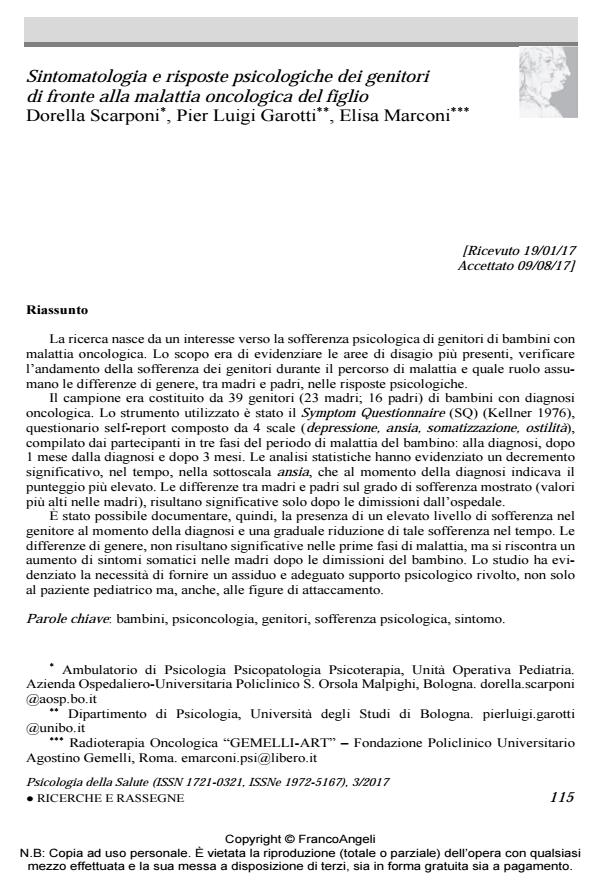Physical symptoms and psychological responses of the parents of a child with oncological disease
Journal title PSICOLOGIA DELLA SALUTE
Author/s Dorella Scarponi, Pier Luigi Garotti, Elisa Marconi
Publishing Year 2017 Issue 2017/3
Language Italian Pages 19 P. 115-133 File size 319 KB
DOI 10.3280/PDS2017-003006
DOI is like a bar code for intellectual property: to have more infomation
click here
Below, you can see the article first page
If you want to buy this article in PDF format, you can do it, following the instructions to buy download credits

FrancoAngeli is member of Publishers International Linking Association, Inc (PILA), a not-for-profit association which run the CrossRef service enabling links to and from online scholarly content.
The purpose of this research was to deepen the knowledge on the psychological distress of parents of children with oncological diseases. The aim of this study was to identify which areas are the most affected by suffering, check the progress of the parents’ suffering during the course of illness and to assess the role of gender differences in mothers and fathers in psychological reactions. Thirty-nine parents (23 mothers, 16 fathers) of children diagnosed with cancer were recruited. They were asked to complete the Italian version of the Symptom Questionnaire (SQ) (Kellner, 1976). The SQ is a 92 item yes/no questionnaire with four subscales: Depression, Anxiety, Anger-Hostility, and Somatic Symptoms. Participants filled out the questionnaire in three different phases of their child’s disease: diagnosis (T1), one month after (T2), and three months after (T3). Statistical analysis showed a significant decrease of suffering over time, especially in the Anxiety Scale (highest scores at T1). Gender differences (mothers vs. fathers) were found. Mothers had higher scores than fathers, but only after the hospital discharge. Overall, results showed a gradual decrease in the levels of distress of parents from T1 to T3. In regard to gender differences, there were no significant differences during the first phases of the illness, but an increase was found in somatic symptoms in mothers, after their child was discharged from the hospital. This study has highlighted the need to provide an adequate and non-stop psychological support; not only for the pediatric patient but also for his/her caregivers.
Keywords: Children, psycho-oncology, parents, suffering, psychological distress, symptom.
- Psychological Experiences of Parents of Pediatric Cancer Patients during and after COVID-19 Pandemic Antonella Guido, Elisa Marconi, Laura Peruzzi, Nicola Dinapoli, Gianpiero Tamburrini, Giorgio Attinà, Alberto Romano, Palma Maurizi, Stefano Mastrangelo, Silvia Chiesa, Maria Antonietta Gambacorta, Antonio Ruggiero, Daniela Pia Rosaria Chieffo, in Cancers /2024 pp.891
DOI: 10.3390/cancers16050891 - Psychological Impact of COVID-19 on Parents of Pediatric Cancer Patients Antonella Guido, Elisa Marconi, Laura Peruzzi, Nicola Dinapoli, Gianpiero Tamburrini, Giorgio Attinà, Mario Balducci, Vincenzo Valentini, Antonio Ruggiero, Daniela Pia Rosaria Chieffo, in Frontiers in Psychology 730341/2021
DOI: 10.3389/fpsyg.2021.730341
Dorella Scarponi, Pier Luigi Garotti, Elisa Marconi, Sintomatologia e risposte psicologiche dei genitori di fronte alla malattia oncologica del figlio in "PSICOLOGIA DELLA SALUTE" 3/2017, pp 115-133, DOI: 10.3280/PDS2017-003006